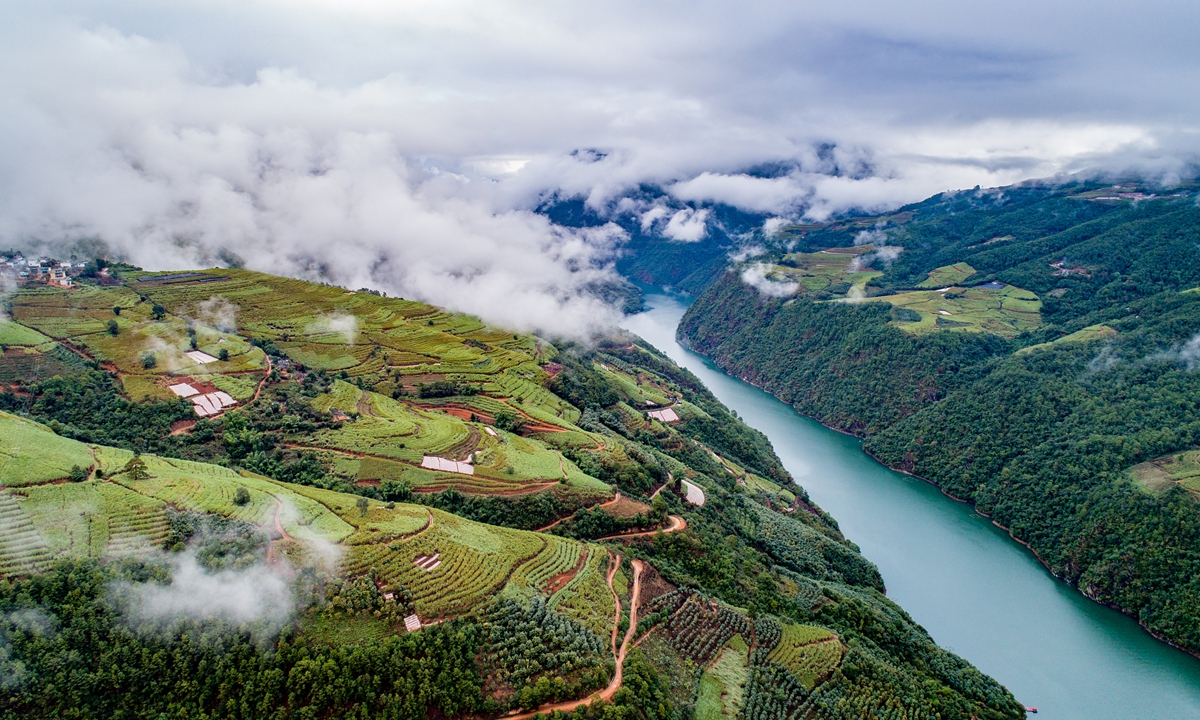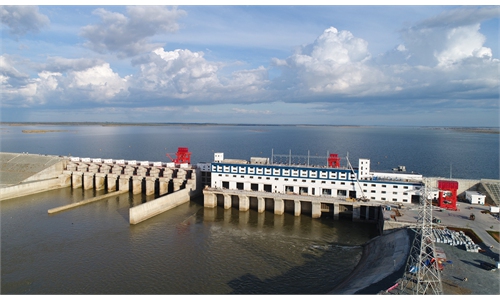IN-DEPTH / IN-DEPTH
Envoys, experts vow further cooperation amid challenges in the Lancang-Mekong region

Mekong River File photo:VCG
Envoys and experts from countries of the Mekong River region vowed tighter cooperation at the 2022 Lancang-Mekong Cooperation (LMC) on Water Resources Week, held virtually on Tuesday, to promote high resilience water governance in the region amid increasing natural challenges and political pressure and provocations by forces outside the region .
Water cooperation has long been a crucial part and a priority aspect of the LMC, which has seen fruitful consensus and outcomes in sustainable development among six riparian countries. Collaboration of the six partners has been continuously strengthened while information sharing keeps broadening to jointly cope with more frequent floods and droughts in the region caused by global climate change, Zhong Yong, head of the Joint Working Group on Water Resources Cooperation of the LMC from China, suggested at the meeting.
Zhong and other experts called for closer exchanges, especially when "certain countries and organization out of the region deliberately ignore the facts and mislead the public by using baseless ideas which are totally out of the reality of Lancang-Mekong countries."
Western media and some US-backed institutions have ramped up efforts to smear the Chinese dams located upstream, accusing them of endangering fish stocks and the livelihood of local residents, while turning a blind eye to the essential role of the dams in alleviating downstream droughts.
"They always put the responsibility of flood and drought disasters on reservoirs and dams. Such behaviors deny the contribution of water infrastructure to the regional economic and social development, as well as to local livelihoods," said Zhong.
Globally, construction of water projects to address flood and drought disasters are mainstream measures and essential options for countries to develop their economy and safeguard the livelihood of their population. Public information show that large-scale water projects in the US have effectively monitored all rivers and streams, reservoir capacity per capita in the US is five to six times of that in China and some projects have operated for more than 100 years, said Zhong, also a delegate of the Department of International Cooperation, Science and Technology at the Ministry of Water Resources of China.
The US built a number of reservoirs in Canada to address floods in the northwest of the country since 1964. In Europe, Norway, Switzerland and Sweden have turned over 90 percent of their resources into hydropower .
"Take the Colorado River in the US as example, its average annual runoff is about 20 billion cubic meters but the reservoir capacity along the river reaches more than 70 billion cubic meters, nearly four times of the annul runoff. Comparatively, water storage capacity along Lancang-Mekong River basin is even less than 10 percent," Zhong remarked.
A recent scientific study revealed that the drought characteristics of the Mekong River basin tends to experience a wetter rainy season and a drier dry season with the rising temperature considered under climate change, the study's researcher Liu Hui, from the China Institute of Water Resources and Hydropower Research, told the Global Times on Tuesday, calling for more effective strategies to enhance food and drinking water security in the basin.
However, in spite of such facts, some countries put their fingers on the hydropower projects and publish biased and flashy news to cause mischief between China and downstream countries who are eager to develop their economies with a solid infrastructure.
"It is indeed a double standard and we should keep alert about this," Zhong warned.
Diplomats and experts from Myanmar, Laos, Cambodia, Thailand and Vietnam are appreciating and recognizing China's efforts in fully respecting the legitimate rights and interests of countries downstream and taking care of each other's major concerns.
They praised the positive role of hydropower stations on the upper Mekong River in "storing flood water in the wet season and discharging it in the dry season," in addition to the essential function of water conservancy infrastructure in promoting sustainable social and economic development.
They vowed to strengthen cooperation with China, based on the principle of consultation, to convey objective and scientific information to the public.
"Among the numerous successes in the MLC framework, cooperation on water resources was elevated to the ministerial level in 2019 and China has committed to sharing year-round hydrological data with MLC member states. These developments demonstrate the strong political will of the MLC member states to further enhance transboundary water governance in the Mekong - Lancang River Basin," Natthira Krasaesarn, Minister-Counsellor of the Royal Thai Embassy to China, said at the meeting.
Tran Thanh Hai, Counsellor of the Vietnam Embassy to China, also highlighted the MOUs signed between the two countries on projects under the Chinese-funded Mekong-Lancang Special Cooperation Fund in 2021.
The project includes upgrading and improving rural clean water supply works, strengthening Vietnam's domestic water supply system, ensuring clean water security for people in disadvantaged areas in Dien Bien, and poverty alleviation through development of agricultural production and trade in the Vietnam-Laos border areas.
"These practical projects, once completed, will greatly improve the livelihood of the Vietnamese people in disadvantaged areas. Vietnam highly values the support of China and LMC member countries through the LMC Special Fund and hopes the fund will continue to aid projects in our prioritizing areas," said Tran Thanh Hai.
Amid the flare-ups of COVID-19 and a sluggish world economic recovery, the six countries vigorously carried out cooperation on COVID-19 response, strengthened people-to-people and cultural exchanges and worked together to promote economic recovery. In 2021, trade between China and the five Mekong countries reached nearly $400 billion, registering an increase of around 23 percent and making positive contributions to promote the economic recovery of the countries of the region and their people's wellbeing.


